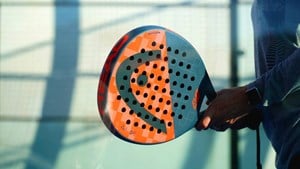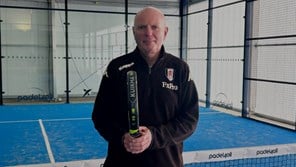What is padel – and why are so many over 60s hooked on it?
7 minute read

Padel, a fun and social doubles game that combines elements of tennis and squash, is the world's fastest-growing sport [1]. Age Co chats with three enthusiasts who discovered padel later in life – and are loving it.
Had Bob (74), Glenn (63) and Tom (73) not been curious enough to ask about a building being constructed at their local golf club, they may never have taken up padel – a sport that has become an integral part of their lives.
What is padel?
The sport was first developed in Mexico before taking off in Spain. A padel court is considerably shorter than a tennis court. And unlike tennis, players use solid racquets and favour strategic shot placement over power. It is predominantly a doubles game – meaning it has a huge social element.
“You don’t have to run all over the place like tennis, but it still provides a great workout,” says Bob, who was first introduced to padel while living in Spain.
Padel facts:
- Match format: Best of three sets, with the team winning two sets, declared the winner [2].
- Scoring: Mirrors tennis scoring (6 games per set), but matches are generally shorter in duration (about 90 minutes).
- Weatherproof courts: Most UK courts are covered, ensuring year-round play regardless of weather conditions.
- Beginner-friendly: Introductory courses cater to various skill levels.
- Equipment provided: Clubs typically provide all necessary equipment.
- Attire: Comfortable sports attire and clean trainers .
- Cost: You can get an intro lesson for £5 at Padel4All locations [3]. Friendly competitions – for, say, four sets of doubles partners – cost on average £9 per player for 90 minutes of play. Non-club members could expect to pay £35 to hire a court for four players for an hour, but that’s at the high end. Park Sports in London, for example, offers hourly rates of £15.65 [4].
- Family-oriented: Many clubs offer family sessions, encouraging multi-generational participation.
- Padel is booming in the UK: A total of 250 padel court facilities were built in the UK between 2022 and 2023 – up 116% in a single year, according to padel court builders Losberger De Boer.
Why is padel so popular?
Glenn, a recent padel convert, was intrigued by the sport after seeing the new courts at his golf club. With a background in racquet sports, he decided to give it a try and was instantly hooked.
“I very quickly got to know a good group of people,” says Glenn. This camaraderie led to the formation of The Foxes, an intermediate-level group that meets weekly.

The social bonds extend beyond the court, with the group enjoying drinks, curry nights and even padel trips to Spain together. “The social aspect of our group is very important,” says Glenn. “Our ethos was to be open, welcoming and friendly to everybody.”
Luke Bedwell, a co-manager at the Basset Down and Bristol Padel4All clubs, emphasises padel's social and fitness aspect – noting that some members are playing well into their 80s. “The social element of it is massive, which is helping to build friendships, relationships and connections, and build up people's confidence,” says Luke.
Tom’s introduction to padel was also serendipitous. An avid player of fives, a handball sport akin to squash, he was left searching for an alternative when Covid restrictions halted his weekly fives fix.
“It's quite a strange story, really,” he recalls. “Because of Covid they wouldn't let us play fives. Somebody noticed that this [roof-covered] padel court had just been built. A few of us came along, it appealed to us, so we played a bit. I still play fives – but I prefer this now.”
A semi-retired solicitor, Tom says the social and fitness side of playing sport has always been a brilliant antidote to having a busy working life: “It just clears your head.”
Padel’s strategic side also “makes you think”, he says – adding that, considering Spain's padel culture, “grabbing a drink together after a match is almost a condition of playing”.
Give padel a try
For newcomers, Tom offers words of encouragement: “If you've got any sort of ball sense, you can play it. Nobody should worry about whether they feel they're not very good at it. You'll find people who will help you.”
Someone like Glenn, perhaps: “What I'd really like to do now is to coach seniors,” he says. He’s training to be a qualified padel coach, with the main aim being to get his students to enjoy the sport – “because that's all that really matters”.
Summary: what are the benefits of playing padel?
Social connection: Padel fosters strong social bonds and friendships, with players often forming groups and enjoying activities outside the sport.
Improved fitness: Participants report feeling fitter and healthier due to the physical activity involved.
Enjoyable exercise: Unlike some forms of exercise, padel is considered fun and engaging, making it easier to stick with. Bob encourages people to take lessons to get the “proper technique”, and to stretch before and after playing to avoid injury.
Mental well-being: The social interaction and physical activity in padel can contribute to improved mental health and reduced stress.
Travel opportunities: Padel is becoming increasingly popular worldwide, offering opportunities for travel and playing in different locations. Just bring your racket!
Career transition: Padel can even lead to new career paths, such as coaching and padel tourism.

Sign up to the Age Co Newsletter
Each month, our email newsletter delivers inspiring stories, practical guides to later life, plus the latest news about Age Co and the charitable work we support.
